If Google's medical ads are compliant according to Chinese standards?
The following article is based on Xiao Qian's notes The author Xiao Qian
Xiao Qian, a columnist for dozens of well-known technology and financial media.
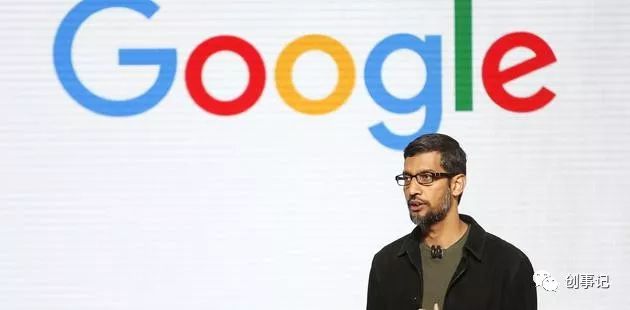
Wen/Xiao Qian (net1996)
Is Google still the Google it used to be? On September 3rd the Wall Street Journal reported that a fake Apple phone number promotion appeared during a Google search for "apple tech support", again raising concerns about the security of search ads.
Medical ads may make users more anxious than scam ads. From human birth to death, medical care has always been a service that cannot be ignored, and medical advertising is a topic of great concern to every search user today.
Recently, a casual search query let the author found that: Google search also exists medical advertising, and even medical advertising there are some exaggerated phenomenon. Why do some of Google's out-of-standard medical ads still appear when foreign regulators have punished Google? If Google's medical advertising is compliant by China's Advertising Act standards, is it?
Google is not searching for clean soil medical ads here is also very rich
First of all, we can first understand the next hospital keywords advertising recommendations. When using Google to search for the word "hospital", "hospital", Google search really did not show the relevant advertising results, Google in the most basic keywords on the still have some certainty.
But if you combine the above keywords with the place, the results are obviously different. When we search for "clinic in South Africa" (swap South Africa for Kenya, Pakistan or even the United States), Google sees advertising results, but the match is vague and the ads are not necessarily all about hospitals.
And when we target the location of our search to the city, the results are more accurate, such as in New Delhi, and the search results are clearer and more efficient than when we search for South Africa. Interestingly, when we searched for "clinic in Shanghai", there were also ads for "Shanghai Ren ai Hospital", but when we searched Chinese, there were no advertising results.
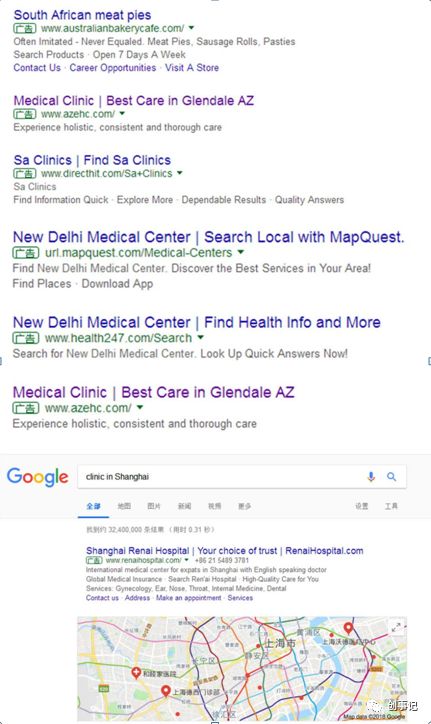
In addition to the hospital as the key word of the bidding ads, other pan-medical institutions are also very rich advertising, especially the moon sub-center advertising is very much. In the case of the Moon Center ads, for example, they appear mainly in Taiwan, China.
In China's Taiwan network environment in Google search "moon sub-center", the first four mobile first screen are ads, accounting for the full screen; This is a serious violation of the requirement that the mainland of China should not exceed 30 per cent.
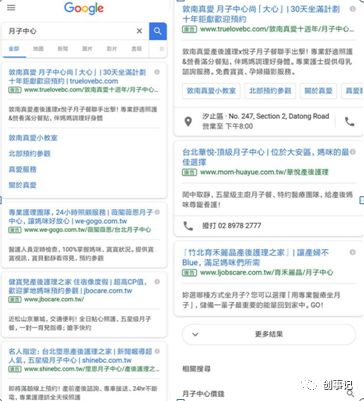
Specific to the promotion of disease keywords, relatively few. Under the influence of official supervision and enterprise self-examination, domestic search engines will basically not be launched under the disease keyword promotion.
Google for specific disease keywords such as high blood sugar, prostate and so on there are a small amount of advertising content, such as search for "high blood sugar" or "prostatitis medicine" there will be corresponding ads, but overall not much, similar to the previous city hospital ads, sometimes found without keywords, is a vague match.

But this is also divided into different diseases, some such as "haemophilia" keyword can see a large number of ads, in the United States network environment through the PC browser search "hemophilia", and in Taiwan, China, the search for "moon center" similar, there will be 6 to 7 results, more than half of which directly provide treatment. It seems that Google's disease ads are indeed treated differently.
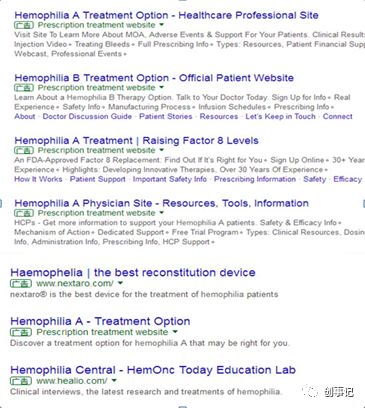
After the medical institutions and disease ads, department ads are also an important part of medical advertising, of which several male ads most affect the user experience, how is Google doing in this regard?
Advertising for men is more visible in Europe, such as the first screen of the search for "Andrology" in the UK, which includes advertisements for local men's clinics in London, and some ads in Taiwan with endorsements of "authority" and other advertising content.
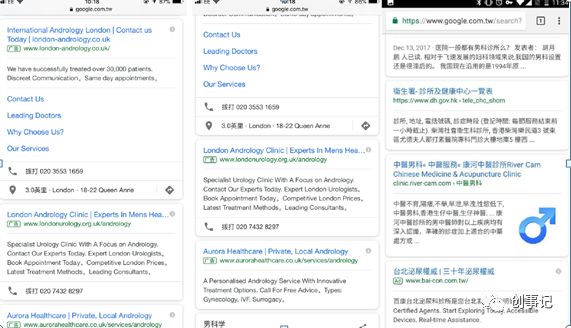
The "most" and "best" Google cosmetic advertising exaggerations do exist
Cosmetic plastic advertising is also an important part of Google's medical advertising, in all regions basically have related advertising business.
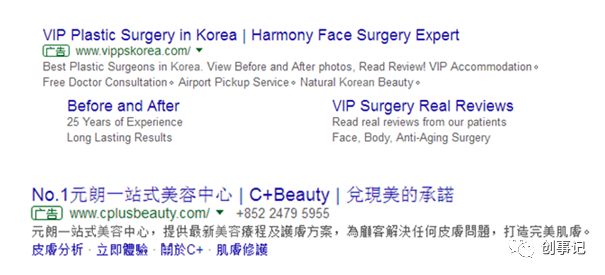
Because overseas regulation of advertising terms is not very strict, advertising here uses a lot of extreme terms, such as "latest" "best" and so on. One ad above claims to be the best plastic surgery in South Korea, while another sells "the latest treatments" and "solving any skin problems for customers", which can easily involve false propaganda.
"The latest treatment" may be true, but "Korea's best plastic surgery" and "solve any skin problems" have become absolute terms, which may not violate the law in other regions, but the problem is that for Chinese mainland users, the level of service and content of the exaggeration is not an accepted advertising performance.
The aforementioned male advertising using "authoritative" endorsements is also suspected of exaggeration. If the medical industry is allowed to make false or exaggerated propaganda, I am afraid it does not bode well.
Weight loss ads have become a feature of Google, Chinese mainland no ads or because they don't cost-effectively
It's worth mentioning that the weight loss ads in Google Search are very special and worthy of warning. In the case of large probability, the overall page of weight loss fitness ads on Google is relatively clean, with text as the main, and the expression is relatively objective.
But compared with hospitals, diseases, departments and plastic surgery ads, Google's weight loss ads are very large, and even China's search engines do not necessarily have so many weight loss ads.
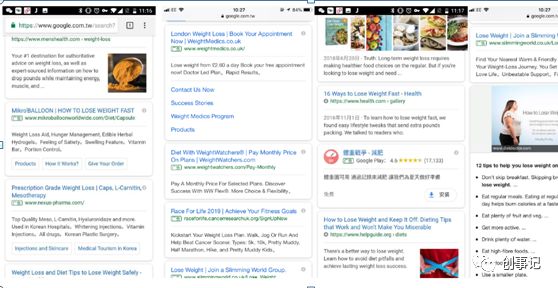
Lenovo thought that today's headlines in different regions to display different ads, and eventually secretly in the third and fourth-tier cities to run illegal ads phenomenon, we can speculate that Google search is also to meet the needs of advertisers and policy risk prevention. On Google's ads, we can see a set of contrasts to support this conclusion: Google's sub-center ads last month were mostly aimed at people in Taiwan, China, and these ads are rarely seen in Europe and the United States.
Although user demand is a big factor, but according to the policies, needs, public opinion in different regions to target medical advertising, and even in some areas of advertising, there is a huge amount of advertising and false publicity, Google can not help but sigh: This is the previous trustworthy Google?
So why didn't google Chinese mainland ads on the site? In fact, Google is not without advertising, but in the domestic inability to access, so no enterprises for the domestic market advertising, which is a very unethyable business for advertisers. This, from the benevolent hospital why only buy English keywords instead of Chinese keywords can be explained: the target audience of this advertisement is temporarily in Shanghai international users.
Without advertisers, there will naturally be fewer ads. In turn, taking Google's advertising business in Taiwan as an example, we can see that as long as there are enough users, Google's medical ads will naturally appear. Full-screen Moon Center ads tell us that Google's experience can also be worrying when it reveals its true face.
Why are there so many Medical Ads on Google?
Behind the benefits or the biggest attraction!
Normally, many people have long believed that Google is unlikely to have medical ads. But based on the above search results, we found that Google does have a lot of medical ads, and even a lot of advertising words are exaggerated more obviously. Why is this the case? There may be several reasons.
(1) Google has been heavily fined by the U.S. government for medical advertising, not initially voluntarily refusing medical advertising
First of all, Google didn't take the initiative to advertise medically in the first place. In 2009, Google's David Whitaker affair caused a huge social attack on Google for helping to publish illegal medical ads. Since then, Google has stopped accepting drugs that are not certified by the U.S. Food and Drug Administration (FDA) and the Pharmacy Council (NABP), as well as online pharmacy advertising, but the medical advertising market remains attractive, including advertisers who are keen to exaggerate.
In this way, it can be said that Google was also forced to lose some benefits under the shelf some medical advertising, not active. It would be understandable if Google had liberalized medical advertising in less regulated areas, a way of making money while avoiding regulation and blame.
(2) Medical advertising is a decompression artifact under pressure from benefits and revenue
Google estimates that 100 million Americans conducted 4.6 billion health-related keyword searches in 2010, when a Pew survey found that 60 percent of U.S. adults searched the Internet for health information, and 60 percent of Internet users said the search would affect their health decisions, Sina Technology reported.
Medical advertising, especially fake ads, can make huge profits for advertisers, and these operations are very profitable in themselves, and the revenue that Google can make from them is considerable.
Although Google has become a technology giant, it will also require significant investment in AI and future technology research and development. In the short term, when these research projects are difficult to generate revenue, the pressure on businesses that can now generate revenue is huge.
The key to Google's risky approach to medical advertising is that in areas where the law is not strictly restricted, Google gets more out of medical advertising, which can really help the search business unzim Google.
(3) The market environment has contributed to the further development of regulatory regressing business interests
At the same time, the external causes of the environment will also play a role in promoting Google search in the international operation, laws and regulations vary from country to country. For example, in places where laws and regulations are less stringent, it may be easier to involve false advertising, or to increase revenue by increasing the use of search algorithms.
This is one of the typical manifestations of not strictly regulating advertisers outside the United States. For example, the Moon Center is considered an afternatal care facility in Taiwan, China, and requires qualification. Through the local health and welfare department's official website inquiries, we will find that in the city of Zhubei, Hsinchu County, can not query the advertising of the "YuYuJing" post-natal care home, so this moon center may not be qualified, but also shows that Google in some areas did not assume the responsibility of the main body of the platform audit.
This situation, while understandable, is undoubtedly difficult for consumers. Google's image was once perfect, but with a lot of medical ads and even a few of them exaggerating, it really raises questions about the accuracy and authenticity of Google's search results.
As a commercial company, Google is right to pursue business interests. But if Google does have a chance to enter China later, users will still need to be wary of Google's search ads, and regulators will focus on regulation.
Xiao Qian, founder of Hulu program, Internet observer, dozens of technology media columnists.

Go to "Discovery" - "Take a look" browse "Friends are watching"